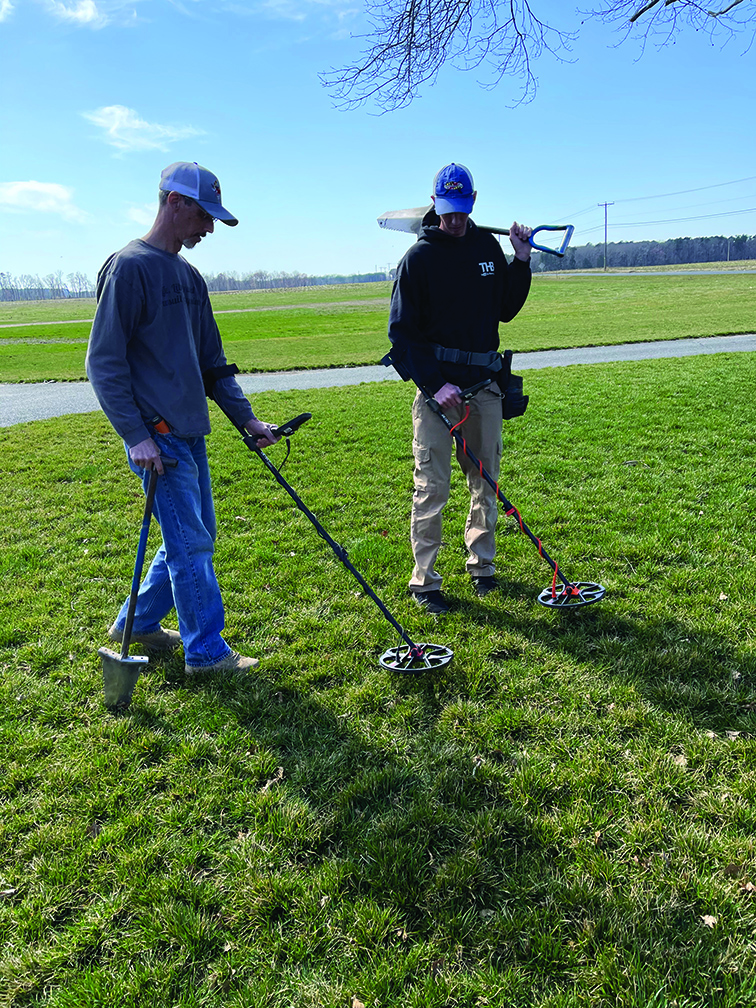
Ron Weippert Jr., left, and his brother Steve, both of Ridgely, have been pulling history out of the ground via metal for more than 30 years. (Photo by Meg Ozman)
If you have ever spotted someone ambling along in a field, slowly swinging a metal detector to and fro with each careful step, and wondered, “What could they possibly be finding out there?”, the answer might surprise you.
The Mid-Shore is rife with history and centuries-old artifacts just might be under your very feet.
Brothers Ron Weippert, Jr. and Steve Weippert both of Ridgely, have been soil sleuths for more than 30 years.
When Ron was 14, he read an article about Richard Clem, who used a metal detector to find relics from the Civil War.
Clem said he would then research the item to learn its story, even going so far as to track down the descendants of a soldier whose identification tag he found on a piece of property that had once been a battle or camp site during the Civil War.
Fascinated by Clem’s hobby, Ron found his address and wrote him a letter expressing his interest in purchasing some of Clem’s findings with some pocket money he had saved up.
To his surprise, a box full of relics arrived via post a few weeks later- a gift from Clem.
The metal detecting bug had bitten Ron, and after his parents bought him a used metal detector at a yard sale he dove into a pastime that has become his passion for the past 35 years.
As siblings often do, Steve followed in Ron’s footsteps, eager to find treasures of his own.
Over the course of the past three decades, the Weippert brothers have taken their equipment up and down the east coast.
They have also teamed up with a detecting group known as The Hoover Boys, whose YouTube channel has more than 80,000 followers and documents their travels.
However, Ron and Steve are proudest of the relics they have found right here on Delmarva.
Along with a host of rare coins from Ireland, Spain and England, the brothers have found such unique items as a Confederate soldier’s wishbone belt-buckle and a sheriff’s badge that belonged to a police officer from New Jersey.
Ron found the badge near an old ferry dock outside Harmony, and was surprised to learn that the officer was buried in Oxford Cemetery.
Ron said he is in the process of tracking down the late officer’s next of kin, so he can return the badge to the family.
Steve’s most cherished find thus far is a commemorative George Washington inauguration button.
Slightly bent, thanks to an encounter with a plow who-knows-how-many years ago, the medal was found in Wye Mills.
Ron and Steve offered some pointers that will help any budding detectorist start off on the right track.
• Invest in a quality detector: While some beginner models can be purchased for as little as $60, the best-performing models range in price from $400-$3,000 dollars. Make sure to read reviews on each model of interest and watch some videos on YouTube that demonstrate the machine’s capabilities and features before making your selection.
• Bring along a pair of headphones to block out noise from the wind and traffic, which will make hearing the tones easier: Some models have a headphone jack, while others are Bluetooth enabled.
• Use a serrated-edge shovel to dig in a circle around your target: This way, once you have recovered your item you can return the plug of sod to the hole, covering up any trace that you have been there. This is courteous to the property owner, and increases your chances of being invited back.
• Purchase a pinpointer, which will help you determine the location of your target within the hole.
Wear gloves to protect your hands from sharp glass or metal that may be in the hole where your target is.
• Use a belt-pouch or bucket to sort your find: Even if what you thought was a silver coin turns out to be an old soda can, take it with you. While searching for treasure, you must also be a good steward of the environment and recycle any trash you find.
• When seeking out places to go metal detecting, consider parks, churches, fairgrounds, home sites, etc.: Ensure these are public places with no trespassing restrictions. When in doubt, reach out to the property owner and request permission.
• Safeguard the privacy of the property owner: If a detectorist publicizes which historic property was the source of their most recent finds, certain rogue individuals may trespass there with the intention of plundering the grounds for relics of their own. Check with the property owner before disclosing details about their location, especially if you plan on making a social media post.
Reach out to other metal detecting enthusiasts for advice on machines, techniques, or locations, or to invite them to come join you on your next trip out: The more, the merrier! For evidence of this, just watch some of the videos on The Hoover Boys’ channel on YouTube.
• Stay positive: “Every swing is different,” Steve explained. Sometimes it is when you are about to pack it up and go home that you find something truly extraordinary.
If you have an interest in local history and want to get some exercise and fresh air, consider taking up metal detecting.
In Ron’s words, “Dig every target” — you never know what could be lying just inches below your feet!



